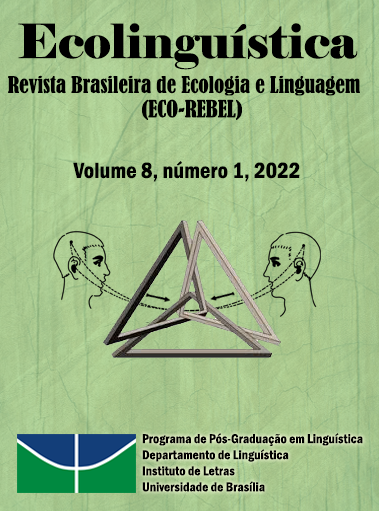Climate change and new life conditions imply transformation of our cultural orders - A Dialectical Eco-linguistic contribution to an eco-civilized development
Keywords:
Mudança climática e as contradições nucleares; Os obetivos de desenvolvimento sustentável da UNU; Linguística dialética; Dialética das relações cultura-natureza; Comunicação transcultural; Dialógo ecológico democrático.Abstract
Como a eco-linguística pode contribuir para a elaboração e realização dos objetivos globais da ONU para o desenvolvimento sustentável? O artigo descreve alguns princípios para a comunicação dentro e entre as comunidades e ecozonas, levando em conta a interdependência dos três parâmetros das condições biológicas, sociais e ideológicas. A mudança climática é hoje um exemplo óbvio de mudança dramática das condições de vida humana. Ela impõe a necessidade de compartilhar territórios e bens de maneira mais solidária. A situação exige novas formas de comunicação transcultural e formas de vida com profundo respeito pela ecologia selvagem e civilizada, de todas as espécies. O artigo se refere teoricamente à tradição ecolinguística de 1987 até hoje, especialmente a Teoria Dialética Dinamarquesa de Linguagem e Ecolinguística (Bang; Døør; Nash; Steffensen, 2007) focalizando nas investigações e análises de todos os tipos de linguagem e linguagear (comunicação, interatividade, discursos, diálogos e textos) no contexto da reorganização das formas de vida humana locais e globais em eco-civilizações mais socialmente iguais e sustentáveis.
Downloads
Downloads
Published
How to Cite
Issue
Section
License

This work is licensed under a Creative Commons Attribution-NonCommercial-NoDerivatives 4.0 International License.
Authors who publish in this journal agree to the following terms:
Authors retain copyright and grant the journal the right of first publication. The work is simultaneously licensed under the Creative Commons Attribution License allowing the sharing of the work with acknowledgment of the authorship of the work and initial publication in this journal.
Authors are authorized to enter into additional contracts separately for non-exclusive distribution of the version of the work published in this journal (e.g., publishing in institutional repositories or as book chapters), with acknowledgment of authorship and initial publication in this journal.
Authors are allowed and encouraged to post and distribute their work online (e.g., in institutional repositories or on their personal page) at any point before or during the editorial process, as this can bring about productive revisions as well as increase impact.
Citation of published works (See The Effect of Free Access).



3.png)



